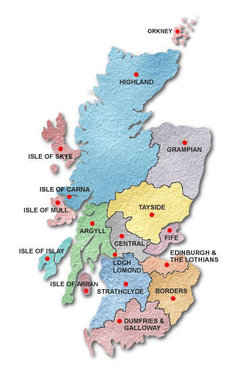Difference between revisions of "Scotland"
m (→Real World History) |
m (→Real World History) |
||
| Line 4: | Line 4: | ||
==Real World History== | ==Real World History== | ||
| − | Scotland is part of the United Kingdom. It makes up the northern part of | + | Scotland is part of the United Kingdom. It makes up the northern part of Great Britain and is bordered in the south by England, in the west by the Atlantic Ocean and the North Channel, and in the north and east by the North Sea. |
| − | Scotland is named for the Scots, a Celtic tribe who migrated from Ireland. The principle inhabitants of Scotland in the | + | Scotland is named for the Scots, a Celtic tribe who migrated from Ireland. The principle inhabitants of Scotland in the first millennium AD were various Celtic tribes, the non-Celtic people called Picts, and the Anglo-Saxons of Northumbria. In [[843]] the Scots king Kenneth mac Alpin, an ancestor of Macbeth, [[Duncan]], and [[Constantine III]], conquered the Picts and became the king of a united Scottish kingdom called Alba. The strife between Macbeth and Duncan was part of a pattern of violent succession among Kenneth mac Alpin's descendants in the tenth and eleventh centuries, probably related to the Scots' lack of a primogeniture custom. |
Scotland defended its independence from England for several centuries. Even when the Stuart king James VI of Scotland, a descendant of [[Canmore]], became the King James I of England, the two kingdoms remained separate. Scotland was not united with England until 1707, during the reign of Queen Anne, when the separate Scottish Parliament was formally dissolved. A new Scottish Parliament was elected in 1999, but Scotland remains subject to the Westminster Parliament as well. | Scotland defended its independence from England for several centuries. Even when the Stuart king James VI of Scotland, a descendant of [[Canmore]], became the King James I of England, the two kingdoms remained separate. Scotland was not united with England until 1707, during the reign of Queen Anne, when the separate Scottish Parliament was formally dissolved. A new Scottish Parliament was elected in 1999, but Scotland remains subject to the Westminster Parliament as well. | ||
Revision as of 12:24, 18 March 2007
Scotland - The original homeland of Goliath and his clan. Scotland is also the ancestral home of Macbeth and the Canmores; the Stone of Destiny and the Loch Ness Monster are likewise linked to it. The gargoyles of the Wyvern clan have had some involvement in noteworthy events in early Scottish history, including Constantine III's murder of Kenneth II in 995, and Macbeth's reign between 1040 and 1057. It is home to one surviving gargoyle clan, the Loch Ness Clan.
Real World History
Scotland is part of the United Kingdom. It makes up the northern part of Great Britain and is bordered in the south by England, in the west by the Atlantic Ocean and the North Channel, and in the north and east by the North Sea.
Scotland is named for the Scots, a Celtic tribe who migrated from Ireland. The principle inhabitants of Scotland in the first millennium AD were various Celtic tribes, the non-Celtic people called Picts, and the Anglo-Saxons of Northumbria. In 843 the Scots king Kenneth mac Alpin, an ancestor of Macbeth, Duncan, and Constantine III, conquered the Picts and became the king of a united Scottish kingdom called Alba. The strife between Macbeth and Duncan was part of a pattern of violent succession among Kenneth mac Alpin's descendants in the tenth and eleventh centuries, probably related to the Scots' lack of a primogeniture custom.
Scotland defended its independence from England for several centuries. Even when the Stuart king James VI of Scotland, a descendant of Canmore, became the King James I of England, the two kingdoms remained separate. Scotland was not united with England until 1707, during the reign of Queen Anne, when the separate Scottish Parliament was formally dissolved. A new Scottish Parliament was elected in 1999, but Scotland remains subject to the Westminster Parliament as well.
See also
- Scotland at Wikipedia, the Free Encyclopedia
